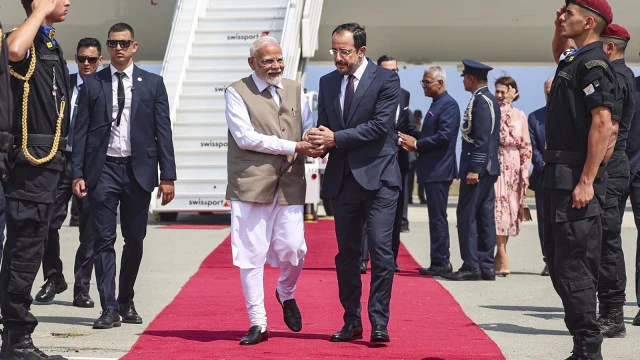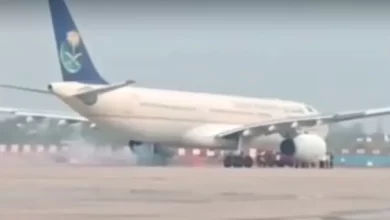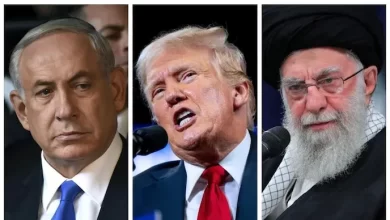
PM Modi arrives in Canada today. G7 talks, trade, and Uranium high on agenda
Prime Minister Narendra Modi embarked on a three-nation tour to the Republic of Cyprus, Canada and Croatia on June 15. This is PM Modi’s first foreign trip after Operation Sindoor – India’s precision strikes on terror camps in Pakistan in the aftermath of April 22 Pahalgam terror attack that killed 26 people, mostly tourists.
PM Modi arrives in Canada today
Modi is scheduled to arrive in Canada by the evening of June 16, marking the second leg of his three-nation tour after Cyprus. At the invitation of the Prime Minister of Canada, Mark Carney, Modi will travel to Kananaskis in Canada on June 16-17 to participate in the G-7 Summit
This would be the Prime Minister’s 6th consecutive participation in the G-7 Summit.
According to a government press communique, the Prime Minister will exchange views with leaders of G-7 countries, other invited outreach countries, and Heads of International Organisations at the summit on crucial global issues, including energy security, technology, and innovation, particularly the AI-energy nexus and Quantum-related issues.
“From Cyprus, I will travel to Kananaskis, Canada to attend the G 7 Summit at the invitation of Prime Minister H.E. Mark Carney. The Summit will provide space for the exchange of views on pressing global issues and the priorities of the Global South. I also look forward to engaging with leaders from partner countries,” the PM said in a departure statement before departing for Cyprus on June 15.
What’s on PM Modi’s Canada agenda?
The Prime Minister will also hold several bilateral meetings on the sidelines of the Summit.
Modi is scheduled to meet his Canadian counterpart, Mark Carney, on the sidelines of the G7 Summit, according to media reports. The discussions, which will see senior officials in attendance, will be around new intelligence-sharing arrangements and work towards curbing misunderstandings.
Group of Seven
The Group of Seven (G7) consists of seven of the world’s advanced economies—Canada, France, Germany, Italy, Japan, the US, the UK, and the European Union.
Carney, an economist and political newcomer, took charge as Canada’s prime minister in March following the exit of Justin Trudeau from the top office.
Modi received a call from Carney earlier this month, during which the latter invited the prime minister to attend the G7 meeting. The call was also an occasion for the two prime ministers to reflect and discuss India-Canada relations and how they can be improved, MEA spokesperson Randhir Jaiswal told reporters on June 12.
Jaiswal said India was exploring a path to reset ties with Canada. He said the upcoming meeting on the sidelines of the G7 Summit will offer India and Canada an important opportunity to exchange views on bilateral and global issues.
“India, Canada vibrant democracies, bound by shared commitment to the rule of law,” Jaiswal ahead of the G7 meeting.
The MEA spokesperson also asserted that the relationship’s “reset” is based on mutual respect, shared interests, and sensitivity to each other’s concerns.
Before the MEA statement, Modi expressed his pleasure after receiving a call from Canadian Prime Minister Mark J Carney, congratulating him on his recent election victory. Earlier, there were speculations that Canada may not send an invitation to Prime Minister Modi, considering the strained relationship with India. Also, there was no certainty if PM Modi would accept the offer and may not attend the G7 summit.
The India-Canada relations have been strained in recent years, especially under the leadership of former Prime Minister Justin Trudeau, who resigned in January, paving the way for Mark Carney. Before the latest victory, Carney was sworn in as the 24th prime minister of Canada on March 14, 2025.
Carney, a political newcomer, had recently described himself as the ‘most useful in a crisis.’ In his campaign, he identified rebuilding ties with India as a priority, signalling a reset in relations between the two nations.
Prime Minister Narendra Modi was among the first global leaders to congratulate Carney for his win.
“India and Canada are bound by shared democratic values, a steadfast commitment to the rule of law, and vibrant people-to-people ties. I look forward to working with you to strengthen our partnership and unlock greater opportunities for our people,” Modi said in a post on X.ada
As things stand, India remains a key strategic partner in Carney’s plans for Canada’s global economic and political engagement, especially given his emphasis on diversifying trade and engaging with like-minded nations.
Strained relations with India
India-Canada relations have been strained since 2023 over allegations by then Trudeau government implicating ‘Indian agents’ in the killing of Hardeep Singh Nijjar, a Canadian citizen and a Khalistani terrorist, outside a gurdwara in Surrey, British Columbia, in June 2023.
In October 2024, ties nosedived further when Canada expelled six Indian diplomats. India denied any involvement in Nijjar’s killing and condemned the accusations as baseless. Subsequently, both countries expelled top envoys, froze trade negotiations, and suspended official visits.
India has been accusing Canada of harbouring extremism in Canada’s Sikh diaspora. Under these circumstances, Carney’s victory is being watched closely. The win, experts say, has opened the door for a diplomatic reset, as Carney is seen as more forthcoming than his predecessor, Trudeau.
New Delhi views any support for Khalistani elements abroad as a threat to national security. Trudeau was seen as a leader unwilling to act on Indian concerns.
Canada has nearly 18 lakh residents of Indian origin. Of these, the Sikh population is roughly 7.7 lakh. Another 10 lakh Non-Resident Indians are in Canada as students, skilled workers, and temporary workers.
Bilateral trade and Uranium
Bilateral trade between the two nations stood at $8.6 billion in 2024, which many say is below the potential. The 6th India-Canada Ministerial Dialogue on Trade and Investment was held in Ottawa in May 2023.
Some reports said that India’s Department of Atomic Energy and Canada’s Cameco could renew their 2015 agreement for the supply of uranium concentrate. Cameco Corporation (formerly Canadian Mining and Energy Corporation) is the world’s largest publicly traded uranium company, based in Saskatoon, Canada. According to many media reports, the company has expressed its interest in renewing the agreement.
When Modi visited Canada in 2015, the two sides signed a $350 million agreement to purchase 7 million pounds of uranium concentrate.





